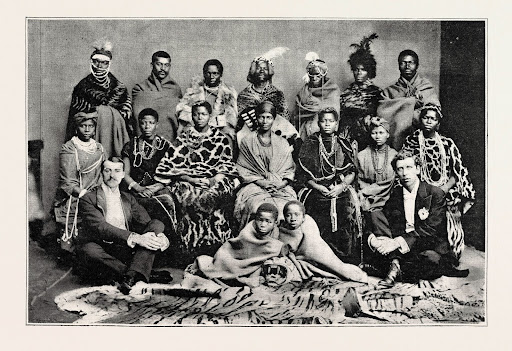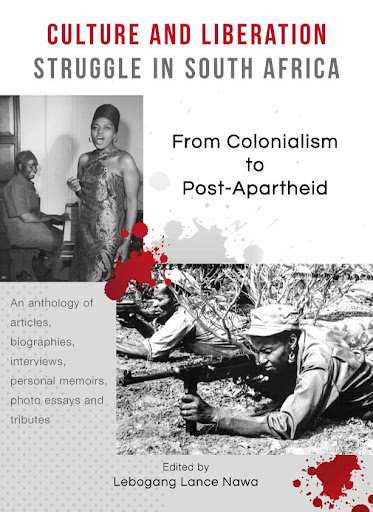Culture of struggle: Diturupa troupes in Makapanstad celebrate the role of black soldiers in the first and second world wars. (Photos: Lucas Styles Ledwaba)
The grand narrative of the South African liberation struggle is naturally problematic on many levels. It dabbles liberally in romanticism and political narcissism, the principal result of which has been debilitating navel-gazing, potted and ideologically lazy historical accounts, and, of course, outright fabrications. Culture and the Liberation Struggle in South Africa: From Colonialism to Post-Apartheid makes a crucial contribution to upsetting the apple cart, at least in so far as it centres culture in the animation of radical political consciousness, principally African nationalism and Black Consciousness.
Mainstream narratives typically ignore culture in accounting for the genesis and evolution of radical consciousness among the victims of colonial conquest and subjugation in South Africa. These accounts, regrettably, mask the reality that the liberation struggle was as much about self-determination as it was about self-image, a perpetual battle to define the self in its own terms. But as African American scholar Cornel West argues: “These challenges (of self-determination and self image) are abstractly distinguishable, yet concretely inseparable. In other words, culture and politics must always be viewed in close relation to each other.”
Culture and the Liberation Struggle in South Africa necessarily focuses attention on the imperial project’s superstructure and its effects on the native population. The different chapters deliberate on how colonialism and apartheid influenced identity formation and expression in African communities. Using the tools of colonial acculturation, progressive native cultural practitioners produced works that materially subverted cultural imperialism and upraised radical consciousness among the oppressed. These instruments included the written word, language, music, theatre, cinema and media.
One of the anthology’s examples is a poem, Fight with the Pen, by Isaac Williams Wauchope. Written in isiXhosa, in 1882, it is arguably the original appeal for the use of “culture as a weapon of the struggle”. Mhudi, penned in 1919, also cited in the book, represents an early heeding of the exhortation. Through the fictionalised historical account, author Sol Plaatje counters prejudiced discourses on precolonial African history and seizes the initiative to self define. Culture and the Liberation Struggle in South Africa further chronicles a host of other overt and subtle instances of rebellion against colonial norms of discourse and aesthetic representation.
In addition to accounts of the resistance to cultural hegemony, for instance in the beauty industry as Nakedi Ribane deftly elucidates, the anthology traces the dispersion of radical consciousness through various art forms. It also recounts the role that black cultural formations and individual artists played in the liberation struggle. Many of the subjects the anthology tackles have invariably been written about before, but perhaps not at the same level of accessibility for ordinary readers. The writing style in Culture and the Liberation Struggle in South Africa averts the pretentiousness chracteristic of most academic writing, without becoming simplistic.
 Subverting cultural imperialism: The African Choir, comprising choristers from the Eastern Cape, toured Britain in 1891. (Photo: Universal History Archive/Universal Images Group/Getty Images)
Subverting cultural imperialism: The African Choir, comprising choristers from the Eastern Cape, toured Britain in 1891. (Photo: Universal History Archive/Universal Images Group/Getty Images)
Meanwhile, the anthology includes a series of original historical accounts, commentary and analysis. For example, it dismantles the popular thesis in South African English Studies that Drum magazine pioneered short-story writing by Black writers in the 1950s. Lebogang Lance Nawa, in the chapter, People’s Literature, marshals and presents evidence that the Cape Town-based The Guardian newspaper published brief fictional prose by Black writers from as early as the late 1930s. In the same vein, academic Jabulani Mkhize unveils the little-known short-story writing exploits of struggle stalwart Harry Themba Gwala, published in Fighting Talk and The New Age between 1957 and 1962, before he gained recognition as a firebrand activist.
Culture and the Liberation Struggle in South Africa draws its insights from a diverse and intergenerational mix of contributors. Legendary cultural practitioners, notably Wally Mongane Serote, Vusi Mahlasela and Ribane, write side by side with their emerging counterparts, academics and journalists. Other notables include seasoned scribes Sandile Memela, Sam Mathe, Styles Lucas Ledwaba, Vukile Pokwana and Nawa, who edited the anthology and contributed several essays.
The contributors do not shy away from controversial subjects, such as the politics of language. For instance, in one of the chapters, Mathe makes a thought-provoking case, again using Mhudi as an example, of how the native population appropriated and used the English language as a weapon in the fight against colonialism and apartheid.
The periodisation of the anthology opens up an interesting, though perhaps also provocative, debate. It covers the years 1916 to 2020, but still refers to the prior period for historical context. The cutoff point is politically loaded, because it is widely presumed that the liberation struggle should have ended in 1994 with the death of legislative apartheid.
The chapters dealing with the contemporary times are in the last section of the anthology, titled Politics and the Arts in Post-Apartheid South Africa (1994-2020). This is, perhaps, the part that could trigger the biggest reader interest, because it speaks to contemporary issues and debates. Sadly, the scenario it paints does not look pretty. The topics the section addresses include national cultural policy, governance issues and media transformation. One leitmotif resonates throughout: most of the challenges of the old order still exist. The arguments are not presented without the required nuance, nor with contrived radicalism.
 ‘Culture and the Liberation Struggle in South Africa: From Colonialism to Post-Apartheid’ draws its insights from a diverse and intergenerational mix of contributors. (Image courtesy of Lebogang Lance Nawa)
‘Culture and the Liberation Struggle in South Africa: From Colonialism to Post-Apartheid’ draws its insights from a diverse and intergenerational mix of contributors. (Image courtesy of Lebogang Lance Nawa)
The section proffers rational and constructive, but still trenchant, critiques of the status quo, revealing deep-seated frustration. For instance, Serote, commenting on government policy failures concerning indigenous knowledge systems (IKS), states: “Unofficially, and because of hearsay, if the DAC [department of arts and culture] has not declared IKS mumbo-jumbo, it has done so through pure innocent ignorance and neglect by those in the government who have, to say the least, unconsciously (we hope), neglected this national treasure. Colonialism and apartheid had, besides declaring it pagan and primitive, also declared it a public domain, in other words, a free-for-all domain.”
Culture and the Liberation Struggle in South Africa reminds the readers of the pervasiveness of the vestiges of racial prejudice in media discourse and aesthetic representation. Not even the racial diversification of newsrooms has helped much in this regard, Memela observes in one of the chapters. But it is not all doom and gloom. Music, dance, film, theatre, literature, art and other forms of cultural expression continue to navigate the hostile terrain with varying degrees of success, and contributions to the anthology celebrate the small triumphs.
Crucially, there is a blossoming of cultural productions that provide not just a passive mirror of reality, but also contribute to shaping a new, equitable social reality. The various chapters in the anthology review some of these. Emerging filmmaker and contributor Obett Motaung shines the spotlight on the irreverent critique of post-1994 corruption and the Jacob Zuma presidency in the form of the local film Wonder Boy for President. The reviews underscore the role that cultural practitioners continue to and should play as a bulwark against state excesses in the current political milieu.
Culture and the Liberation Struggle in South Africa is a valuable book, mainly because of the breadth and treatment of its various topics. The vastness of the period it covers was always going to make an exhaustive narrative a tall order, but this is not what it seeks to achieve. The chapters are self-contained and delivered through essays, biographies, tributes, memoirs, interviews and photo essays.
Overall, the book succeeds in weaving disparate parts into a cogent, rounded reservoir of historical memory from a different vantage point. The central argument that it makes of culture as a catalyst for nation-building and the quest for true freedom demands the urgent attention of all — practitioners, policymakers and society at large.
Culture and Liberation Struggle for South Africa: From Colonialism to Post-Apartheid is edited by Lebogang Lance Nawa and published by Ssali Publishing House